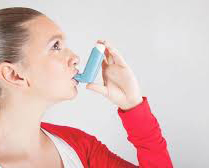Reality Check: Can Chlorine Give You Asthma?
Chlorine is thought to lead to health risks, spanning anywhere from allergies to rashes to asthma. If a chlorine allergy is on your list of concerns, fear not. It’s been proven that you can’t actually be allergic to chlorine.
With that being said, chlorine has the potential to create or contribute to respiratory problems — lifeguard lung and asthma being two of the leading risks. The great debate is whether or not chlorine can actually trigger asthma.
What is Asthma?
 Great question. We all associate asthma with the inhaler. It deals with breathing, but what exactly does the condition entail?
Great question. We all associate asthma with the inhaler. It deals with breathing, but what exactly does the condition entail?
Asthma, according to Mayo Clinic, is a condition in which your airways narrow and swell and produce extra mucus. Symptoms include difficulty breathing, coughing, wheezing, and shortness of breath.
Triggers of Asthma
There are two main explanations for the development of asthma: hereditary factors and environmental factors. You may have a tendency to develop asthma if it runs in the family. Similarly, you may be affected by your environment if you inhale smoke or chemicals on a regular basis.
The Impact of Chlorine
If you spend an extensive amount of time in the pool, particularly as a lifeguard or swimmer, your breathing may be impacted by the chlorine you intake. It could trigger asthmatic symptoms, like shortness of breath or difficulty breathing, and it could eventually take on a greater condition. It will typically take on one of these paths:
 1) There’s a possibility that you are already susceptible to asthma, whether it be through your family history or your environment. If that’s the case, spending a lot of time in pools could manifest that underlying asthma. 2) Rather than being affected by the chlorine, you may be affected by your exercise levels. Exercise-induced bronchoconstriction, commonly known as exercise-induced asthma, is a condition where your airways become narrow as a result of physical activity. 3) Being around chlorine could worsen existing breathing conditions or asthma.
1) There’s a possibility that you are already susceptible to asthma, whether it be through your family history or your environment. If that’s the case, spending a lot of time in pools could manifest that underlying asthma. 2) Rather than being affected by the chlorine, you may be affected by your exercise levels. Exercise-induced bronchoconstriction, commonly known as exercise-induced asthma, is a condition where your airways become narrow as a result of physical activity. 3) Being around chlorine could worsen existing breathing conditions or asthma.
The answer is a mixed bag of yes and no. While chlorine can not directly cause asthma, it can manifest breathing problems that end up leading to asthma, or that evoke asthmatic symptoms.
In order to avoid any of these potential symptoms, it is recommended that you stay in tune with your body, listen to your swim coaches or lifeguards, and pay attention to any changes in your breathing patterns.
To be sure that you are not missing out on any of our lifeguard videos & stories, please subscribe to our newsletter here.
For videos, articles, & events about lifeguarding related industry topics, visit www.lifeguardtv.com





